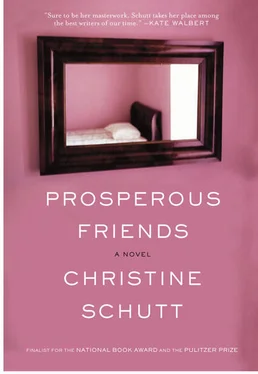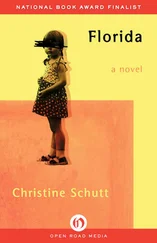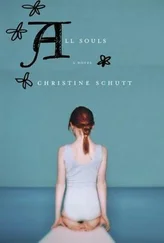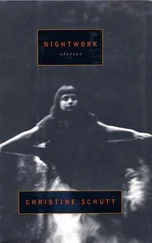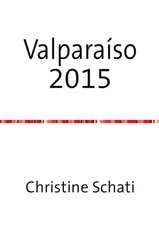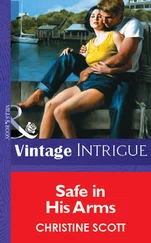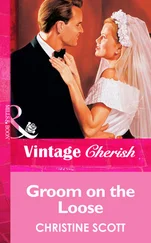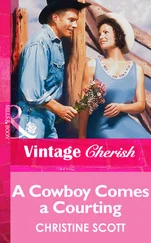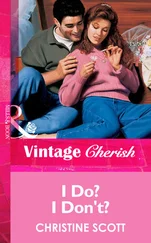Christine Schutt - Prosperous Friends
Здесь есть возможность читать онлайн «Christine Schutt - Prosperous Friends» весь текст электронной книги совершенно бесплатно (целиком полную версию без сокращений). В некоторых случаях можно слушать аудио, скачать через торрент в формате fb2 и присутствует краткое содержание. Год выпуска: 2012, Издательство: Grove Press, Жанр: Современная проза, на английском языке. Описание произведения, (предисловие) а так же отзывы посетителей доступны на портале библиотеки ЛибКат.
- Название:Prosperous Friends
- Автор:
- Издательство:Grove Press
- Жанр:
- Год:2012
- ISBN:нет данных
- Рейтинг книги:5 / 5. Голосов: 1
-
Избранное:Добавить в избранное
- Отзывы:
-
Ваша оценка:
- 100
- 1
- 2
- 3
- 4
- 5
Prosperous Friends: краткое содержание, описание и аннотация
Предлагаем к чтению аннотацию, описание, краткое содержание или предисловие (зависит от того, что написал сам автор книги «Prosperous Friends»). Если вы не нашли необходимую информацию о книге — напишите в комментариях, мы постараемся отыскать её.
Prosperous Friends
Prosperous Friends — читать онлайн бесплатно полную книгу (весь текст) целиком
Ниже представлен текст книги, разбитый по страницам. Система сохранения места последней прочитанной страницы, позволяет с удобством читать онлайн бесплатно книгу «Prosperous Friends», без необходимости каждый раз заново искать на чём Вы остановились. Поставьте закладку, и сможете в любой момент перейти на страницу, на которой закончили чтение.
Интервал:
Закладка:
Relief not to be hungry at all but rather pleasantly distracted by the body’s other parts. Nipples, for example, hers prickled, and she touched herself and leaned into the corner of her desk, and she played — the way she remembered as a kid, skipping little words over the placid future: ram, cat, slut, cunt —rubbed against the corner of her desk. If Clive were only a woman was a thought that was pleasurable.
Clive Harris, at his nephew’s marriage to Phoebe Chester — over a year ago, February? She had not forgotten. Clive Harris had pulled her up against the old club’s coffered wall to save her from the press of the tuxedo crowd. “To see the club’s library, a woman must be escorted by a member,” he said. “Would you like to see it?”
“Would I?”
Real excitement at a wedding at last!
*
After breakfast — skipped — Isabel stood at the long closet mirror. She looked just as she had hoped to look when being nasty to Ned, lovely, at ease. Waste of time to be mean, but when had she ever been wise? She had kissed another man, not her husband, at a wedding, which was not a big deal, except that today she hoped to kiss this man again with clearer intentions. She had really almost forgotten him. Clive Harris, he said in a voice unused to being forgotten. The Union Club. Ben and Phoebe’s wedding, remember? She remembered. Also the visit to Ben and Phoebe’s, the mouse, and a moment when she stood at the guest-room window looking out at Ben Harris, some distance from the house in the vegetable garden, practicing good husbandry with a rake and seeds. His long reach and the steady way he worked. Ben Harris was a good man, and his uncle, Clive Harris, the painter, was he so very good? Her own reflection in any surface was most often pleasurable — except that she was too fat! Too fat! But Fife had said, “You’re skinny enough, just dull.”
Now there was tonight with Clive Harris at a restaurant in Midtown, but she had plans she had to change first. She explained to Ned that she had been invited to dinner by Ben Harris’s uncle, Clive Harris, and that, in the flush of the invitation, she had forgotten about the reading. “I’m sorry to miss him,” Isabel said, then, “but this way you and Stahl can really talk. And who knows?“ Who knows was an inducement to go anywhere, meet anyone, try anything, but his easy acquiescence to her absence made her wonder: What event was it first diluted the marriage, or was it an absence of event, Isabel’s failure to make something worth regarding? Where was her book, her business, her flaring discovery? She spoke no other languages, had no hobbies — unless reading was a hobby. She was paid like a hobbiest in the freelancing world. Also she tutored. She had work.
*
“You put me in mind of my daughter,” Clive said. “You’re about the same age.”
“I’m thirty-four,” Isabel Bourne said.
“Right,” he said. “Sally’s forty. I’m glad you look surprised.” Clive leaned across the table nearer to Isabel. He knuckled her cheek: How warm she was, blushing. Their waiter was smitten, too, and directed his attention solely to Isabel and talked at length of what could be had from the dessert case. According to the waiter, there was, yes, indeed, an eight-layer cake if she cared to look.
But no, she didn’t.
“I trust you,” Clive said, and the waiter seemed surprised to see Clive and noted the order as if calculating all — eight layers, fifteen dollars, plus wine, sea bass, a decorative appetizer, how old — how much was that? Clive might have been Isabel’s father.
“Clive?” she asked.
“Isabel? I bet they have sorbet.”
“Orange, raspberry, lemon, coconut.”
“Raspberry,” she said to their careful waiter, who bowed and backed away.
A halfhearted restaurant with swagged Arthurian touches — torchlights and crests, blood-brown carpeting — only the tapestries of courtly love and valor were missing. He thought of dungeons, plagues, Boccaccio and his pigs: Stink was linked to putrefaction; putrefaction to pestilence; a pleasant smell meant purified. Isabel’s hand was all lily of the valley and clean; her nails were shell. “You are inspiring,” he said, “but this restaurant we’ve found. .”
“Is silly,” she said.
Clive smelled her hand once again, and the restaurant turned buoyant, and the service, the service was, well, here came their waiter with dessert already: the eight-layer cake, white with red filling, weddinglike and flouncy on a tablecloth scraped so clean that the dinner seemed to be starting again, and Isabel was saying she would like it to start again. “And I’m not fond of Wednesdays.”
“Ah, hah.”
“Would there be anything else?”
“No thank you.”
“I’m baffled,” she said once the waiter had left. “You baffle me.”
Not a remark to answer, but Clive smiled at the small hook Isabel used to catch him. He, a ravaged carp, practiced in taking advantage of the stunned or wounded, although his appetite, of late, had dulled. And why cloak his intentions so darkly? He wanted to be kind if only Isabel would hold still and let him look at her: bark-brown hair and eyes; eyes wide apart, pale face.
“What about your wife?” she asked.
“What about my wife?”
They stood on the sidewalk, empty taxis passing. “What’s her name?” Isabel asked.
“Dinah,” he said.
“I’ve never known a Dinah before,” she said.
“Now you do,” he said. “It’s a name people like to say.”
He made a large, showy whistle and a cab swerved in with accompanying verve, and Clive offered her up and sent her home. The cabdriver was on the phone speaking in a furious language, and Isabel was glad to get out of the cab, away from the close, coarse — too mortal — smells, his and her own. The cloudy partition, his impossible name. Only the turban helped. A Sikh.
Poughkeepsie first, then London, now the city Nick Carraway liked, and she still saw the world as through a window. Why couldn’t she be like F. Scott Fitzgerald, or maybe she was like Fitzgerald, and “both enchanted and repelled by the inexhaustible variety of life.”
On her way to the tutoring center the next afternoon, hot spots in the making bristled high inside her legs and it took all the willpower she could muster to keep from wheedling her hand down her tights to press her cooler fingers against the heat of what was happening: hives, scrofulous signs she saw when she chugged down her tights in the ladies’, hot, dime-size, repellent pustules — pink, itchy — high on the inside of her legs. Hives. “Fuck me!” And she scratched at the hives until they popped, like blisters, with warm blistery water inside. So much for sitting comfortably with the dull boy Adam. Did he like The Great Gatsby ? The two-hour session heaved along and she really couldn’t tell. Adam read so flatly she took over, so what did they learn together, she doing most of the talking, both of them wriggling in their seats?
Once home, she drank soup and took hot baths but still felt dirty. Worse, Clive Harris did not call, not the next day or the next, so was it any wonder she got sick? Here again were the near-dead, weird days when she lived as in a closet in her migraine hell: her bed, a box of rags; her heart, a corner, spooky. Sometime in the night — the next night, the next day? — Ned crossed the room; then the room emptied of people, and Isabel shut her eyes but they wouldn’t stop working: The pink underside of her eyelids, a million pixels, blinked; the sight made her sick, but when she opened her eyes, she turned sicker — always the way with her.
*
“Clive?” The curtains in the bedroom were drawn, and she was speaking softly from her bed.
“Isabel?”
Читать дальшеИнтервал:
Закладка:
Похожие книги на «Prosperous Friends»
Представляем Вашему вниманию похожие книги на «Prosperous Friends» списком для выбора. Мы отобрали схожую по названию и смыслу литературу в надежде предоставить читателям больше вариантов отыскать новые, интересные, ещё непрочитанные произведения.
Обсуждение, отзывы о книге «Prosperous Friends» и просто собственные мнения читателей. Оставьте ваши комментарии, напишите, что Вы думаете о произведении, его смысле или главных героях. Укажите что конкретно понравилось, а что нет, и почему Вы так считаете.
